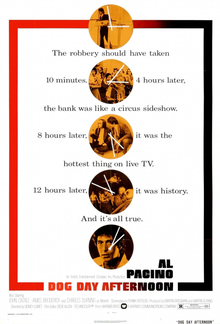 |
| Source: Wikipedia |
Like the guys who robbed a New York City bank to pay for the leader’s boyfriend’s sex change operation. Well, try to rob a bank. Spoiler alert: it's harder than it looks in the movies. Anything can and will go wrong.
Consummate character actor Al Pacino plays a disgruntled Brooklynite with a hot head and a soft heart. Despite his best-laid plans and banking know-how, Murphy’s Law deals him a doozy. One partner chickens out. The other gets antsy. The cops show up, then the TV guys. The hostages gripe. The AC unit conks out, drenching them in the dead heat of August.
Tensions escalate.
The cops drag in people to talk him down. His chatty chubby wife; his frizzy neurotic man-wife Leon; his doting but delusional mother. All to no avail — our anti-hero screams and swears and sweats it out.
The suspense is exhilarating, exhausting. The dialogue is raw. It all feels unbelievably real. (Fitting, because it was.)
For analytic critics, there’s plenty of fodder ripe for interpretation. A critique of capitalism that drove a man to crime. A mockery of fame worship, exemplified by the pizza boy ecstatic about being on TV. A lower-class mistrust of civic authority, represented by the public disdain of police and adoration of these gun-toting maniacs. Or a sympathetic depiction of closeted gays in the seventies.
Or, you know, a fictional analogue of a real event, with no hidden message except entertainment and madness and whatever underlying meaning you attach to reality.
Recommended for any hopeless soul who feels trapped in a stifling marriage or job or gender, any dashing desperado brave and/or dumb enough to risk everything to get shot in the face.
125 minutes.
Consummate character actor Al Pacino plays a disgruntled Brooklynite with a hot head and a soft heart. Despite his best-laid plans and banking know-how, Murphy’s Law deals him a doozy. One partner chickens out. The other gets antsy. The cops show up, then the TV guys. The hostages gripe. The AC unit conks out, drenching them in the dead heat of August.
Tensions escalate.
The cops drag in people to talk him down. His chatty chubby wife; his frizzy neurotic man-wife Leon; his doting but delusional mother. All to no avail — our anti-hero screams and swears and sweats it out.
The suspense is exhilarating, exhausting. The dialogue is raw. It all feels unbelievably real. (Fitting, because it was.)
For analytic critics, there’s plenty of fodder ripe for interpretation. A critique of capitalism that drove a man to crime. A mockery of fame worship, exemplified by the pizza boy ecstatic about being on TV. A lower-class mistrust of civic authority, represented by the public disdain of police and adoration of these gun-toting maniacs. Or a sympathetic depiction of closeted gays in the seventies.
Or, you know, a fictional analogue of a real event, with no hidden message except entertainment and madness and whatever underlying meaning you attach to reality.
Recommended for any hopeless soul who feels trapped in a stifling marriage or job or gender, any dashing desperado brave and/or dumb enough to risk everything to get shot in the face.
125 minutes.
No comments:
Post a Comment